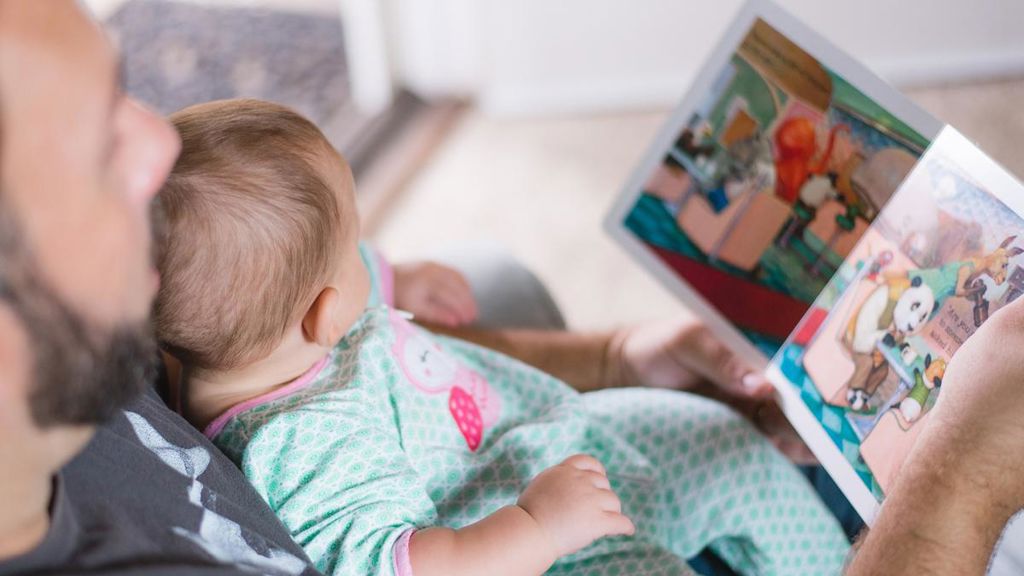Rules concerning parental leave
How early do you need to put in notice for maternity leave? How long do you receive pay during you parental leave? What should you do if you fall ill during you parental leave? Learn more about how you are insured during pregnancy and parental leave.

Plan your parental leave
If you are employed under one of Finansforbundet’s collective agreements, you are entitled to full pay during parts of your leave.
|
For example, if you are employed under the Standard Collective Agreement between Finansforbundet and FA, the mother can take up to 30 weeks leave on full pay, and the father/co-mother can take up to 26 weeks leave with full pay. |
|
|
Pregnancy leave (mother) |
4 four weeks with full pay prior to the birth |
|
Maternity leave (mother) |
10 weeks with full pay after the birth. Starts on the day after birth. The mother is obliged to take leave in the first 2 weeks after childbirth. |
|
Parental leave (father) |
2 weeks with full pay after the birth. The 2 weeks of paternity leave must be taken within the first 10 weeks after the birth. |
|
Parental leave (mother) |
16 weeks with full pay after the birth. can be taken in weeks 11-52 after the birth in a consecutive period, or split into 2 x 8 weeks. |
|
Parental leave (father/co-mother) |
24 weeks of full pay after childbirth. Unless otherwise agreed, leave must be taken as a continuous period or two consecutive periods of the same length in weeks 11-52 after giving birth. Two of the weeks may be taken before week 10. |
You are both entitled to 12 weeks of parental leave if you are both covered by one of Finansforbundet’s collective agreements.
A prerequisite for mother to be able to take all 26 weeks with pay is that the mother has transferred 2 weeks of the transferable leave from the father/co-mother.
You can use our parental leave calculator containing all Finansforbundet’s collective agreements, some public and a number of other private collective agreements.
Weeks with pay are deducted from your maternity/paternity benefits
Remember that weeks with pay are deducted from the 52 weeks of leave of maternity/paternity benefits. This is because the government benefits are paid to your employer as reimbursement for the pay you receive. If you take parental leave at the same time as you receive pay, it will count as double in your government benefits account.
If you are a salaried employee and employed by a company without a collective agreement or paternity/maternity leave rules, you are covered by the paternity/maternity terms in the Danish Salaried Employees Act.
The Act gives the mother the right to half pay for up to 18 weeks (4 weeks pregnancy leave and 14 weeks maternity leave) and parental leave with maternity/paternity benefits. The father has the right to 2 weeks of paternal leave in connection with the birth and parental leave with maternity/paternity benefits.
If you are employed under one of Finansforbundet's local collective agreements, the rules of the Framework Agreement between Finansforbundet and FA will apply.
|
The mother is entitled to up to 28 weeks leave with full pay and the father/co-mother is entitled to up to 14 weeks leave with full pay. |
|
|
Pregnancy leave (mother) |
4 four weeks with full pay prior to the birth |
|
Maternity leave (mother) |
10 weeks with full pay after the birth. Starts on the day after birth. The mother is obliged to take leave in the first 2 weeks after childbirth. |
|
Parental leave (father) |
2 weeks with full pay after the birth. The 2 weeks of parental leave must be taken in within the first 10 weeks after the birth unless agreed otherwise. |
|
Parental leave (mother) |
14 weeks with full pay after the birth. If you cannot agree on when the leave should be taken, you can take it during weeks 11-52 after the birth as 2 consecutive periods of 7 weeks. |
|
Parental leave (father/co-mother) |
12 weeks with full pay after the birth. If you cannot agree on when the leave should be taken, you can take it during weeks 11-52 after the birth as 2 consecutive periods of 6 weeks. Overføres 2 ugers forældreorlov til afholdelse inden uge 10 er det opdeling i 2 x 6 uger. |
You are entitled to 14 and 12 weeks of parental leave respectively if you are both covered by one of Finansforbundet’s collective agreements for insurance agents.
Please remember that pay during maternity/paternity leave for underwriters is calculated in the same way as pay during illness. You can read more about how pay is calculated during illness (and parental leave) in your local collective agreement or under Rules on long-term illness.
Weeks with pay are deducted from your maternity/paternity benefits
Remember that weeks with pay are deducted from the 52 weeks of leave of maternity/paternity benefits. This is because the government benefits are paid to your employer as reimbursement for the pay you receive. If you take parental leave at the same time as you receive pay, it will count as double in your government benefits account.
You will be in exactly the same position when you are on parental leave as if you had not taken parental leave. This means that you have the right to be informed of any pay reviews or negotiations in your company while you are on leave. Parental leave cannot therefore be the reason you are given a lower pay raise or access to pay negotiation.
It can be beneficial to conclude an agreement with your manager regarding when and how you will negotiate your pay next time, even before you go on leave. Remember that you can always request a pay negotiation within this context, even if it is not written directly in your agreement.
Use Finansforbundet’s salary calculator to negotiate higher pay
If you are covered by Finansforbundet’s Standard Collective Agreement or have similar terms, then the company pays both your and the company’s pension contributions during your entire maternity/paternity leave, but not beyond 60 weeks after the birth.
This means that you will not only receive full pension contributions during your parental leave in the periods when you receive full pay, but also during the periods when you are on leave without pay, up to week 60 after the birth.
However, as from 2020, pension contributions will be paid when taking deferred leave later than 60 weeks after the birth, in accordance with Section 11 of the Danish Act on Entitlement to Leave and Benefits in the Event of Childbirth.
The fact that your pension contributions are paid during your parental leave means that you also earn the right to holiday with pay pursuant to the rules of the Danish Holiday Act (i.e. 1-5 holiday
If your employer does not have a collective agreement with Finansforbundet
If you are not covered by one of Finansforbundet’s collective agreements, whether you have the right to pension contributions during all or part of your leave depends on your collective agreement or employment contract. Contact your union representative if you are in any doubt about which rules for parental leave and which collective agreement applies to your workplace.
There are fixed rules in the law and in Finansforbundet’s collective agreements governing when you have to give your employer notice of different parts of paternal leave. We recommend that you give written notice.
Deadlines for notice prior to due date
- No later than 3 months prior to due date: The mother must inform her employer of when she expects to give birth (due date) and state whether she wishes to exercise her right to pregnancy leave prior to the birth. However, it may be a good idea to disclose your pregnancy or fertility treatment earlier, in order to safeguard against dismissal.
- No later than 4 weeks prior to the start of leave: The father must inform his employer of when he expects to take paternity leave.
- No later than 4 weeks prior to due date: The employer must be notified if the father/co-mother wants to take the 8 weeks of leave in the first 10 weeks or if the mother is transferring up to 8 weeks or wants to take other leave during the period, e.g. earmarked parental leave.
Deadlines for notice after due date
- No later than 6 weeks after the birth: Both the mother and father must inform their employers of whether they wish to take parental leave with full pay, as well as when they wish to take their leave.
- No later than 6 weeks after the birth: Both the mother and father must inform their employers of how much leave they wish to take, how they will take it and whether they wish to extend or postpone a part of their leave.
- Within 8 weeks after the birth: Both the father and mother must tell their employer if they want to postpone 5 weeks of leave
Leave can be changed by giving your employer new notice within 6 weeks after the birth. Leave cannot be changed after the 8 weeks, unless your employer agrees.
In the event that a child is hospitalised, the employer must be informed as soon as possible if it means that the leave will be postponed or extended.
You can use our parental leave calculator, which contains details of all notice periods. You could even send it to your employer.
It is only currently possible to use the calculator for children born before 2 August. The calculator will be updated with the new rules as soon as possible.
Parents have a combined right to 52 weeks of parental leave with maternity/paternity benefits, but you also have the right to be absent from work for up to a total of 76 weeks. You are therefore entitled to be on leave for a longer period than you are entitled to receive government benefits.
Below you can see how long it is possible to take your parental leave:
- Pregnancy leave for the mother - 4 weeks prior to the birth
- Maternity leave for the mother - 10 weeks after the birth, of which 8 weeks can be transferred to father/co-mother
- Paternity leave for the father - 2 weeks after the birth
- Parental leave for the mother - 9 weeks earmarked and 5 weeks transferable after the birth.
- Parental leave for the father - 9 weeks earmarked and 13 weeks transferable after the birth. You are also entitled to 10 weeks of leave without maternity/paternity benefits
You can therefore take a total of 76 weeks of leave.
If you are working, you can postpone part of your parental leave. You simply have to take the postponed leave before your child reaches the age of 9. You must be working and fulfil the requirements for maternity/paternity benefits at the time leave is taken.
There are two ways to postpone leave: by right and by agreement. The leave may be postponed by combining both methods.
Rights-based postponement
Both parents have the right to postpone up to 5 weeks of parental leave. You do not need your employer’s confirmation, but we do recommend that you ask for written confirmation of the agreement. Please note that with the new rules, both parents are entitled to postpone the leave using the rights-based method.
You must notify your employer of the postponed leave within 8 weeks after the birth and 8 weeks before the leave is taken. The leave must be taken as one continuous period for children born on 2 August 2022 or later. The old notice period of 16 weeks applies to deferred leave for children born 1 August or earlier.
You retain the right to the postponed leave, even if you change jobs. This means that you have the guarantee of taking the leave at a later date, as long as your employer is given a minimum of 8 weeks’ notice before the start of the leave.
Agreement-based postponement
Both parents may postpone up to 32 weeks of parental leave and take it at a later date, as long as this can be agreed with their employers. This agreement option applies to both parents, but there will still be only 32 weeks of parental leave with government benefits to be shared between both parents.
You are not required to take the leave all at once. You can agree to take it in weekly, daily or hourly segments, as long as your employer is prepared to go along with it. There are no notification rules in connection with agreement-based postponement.
Your new employer is not required to comply with the agreement in the event that you change jobs.
Employed mothers may extend their leave by exercising their right to 18 weeks of absence; fathers/co-mothers by exercising their right to 10 weeks of absence. NO benefits are paid in this case unless maternity/paternity benefits are transferred from the other parent. In other words, this is a right to time off without pay or maternity/paternity benefits.
In addition, you may choose to extend your parental leave by either 8 or 14 weeks. This option (provided by section 10 of the Danish Act on Entitlement to Leave and Benefits in the Event of Childbirth) means you must transition directly from parental leave to extended leave with no periods in between.
You do not need your employer’s approval of the exercise of your right to absence or extended leave, as long as you inform your employer of your intention no later than six weeks after childbirth.
Note that it is not possible to combine the extension of leave under section 10 with either deferral of leave or partial resumption of work.
As a mother, you are entitled to absence with full pay when you need to attend preventive examinations in connection with pregnancy.
Mothers are entitled to absence with full pay if discomfort during pregnancy is documented by the doctor. You are also entitled to absence with full pay earlier than four weeks prior to the expected delivery date in cases where, according to an assessment by the doctor, pregnancy complications have arisen.
The length of leave after the birth is not affected by whether you start your leave earlier than four weeks before the birth. Giving birth before or after the expected delivery date does not affect the length of leave after the birth.
At Lifeindenmark.dk you can read more about which illnesses and discomfort give the right to absence with full pay.
If your child is hospitalised
You can extend your parental leave If your child is hospitalised within 46 weeks after the birth. You can extend your parental leave by the number of days your child is hospitalised, but by no more than three months. However, this right to extend is subject to the condition that you do not resume to work in connection with the child being hospitalised.
If you give birth to more than one child and these children are hospitalised in connection with the birth, the discharge from the hospital will only count from the date when the last child is discharged.
Please note that the right to extend the leave does not apply to paternity leave during the two weeks the father may take within the first 10 weeks.
If you are involuntarily childless, you are entitled to paid absence according to the same rules as for with regular illness. This applies to both examination and treatment.
However, you should be aware that the right to paid absence only applies to the parent who is the cause of the infertility. If the cause of the infertility is not with you, you are not entitled to absence, but you may agree to use holiday time, time off in lieu or hours from the time bank to be able to support your partner.
Some employees considered it to be a private matter that they are in fertility treatment and thus do not want to inform their employer. If this is the case for you, you risk losing the right to paid absence and may even lose possible protection from termination.
Therefore, we recommend that you inform your manager that you are going into fertility treatment and agree with the manager on how to plan it.
As with any other illness, you must try to place examinations and treatment outside of working hours to minimise the inconvenience to your employer. However, this is not always possible, as the treatments must take place at very specific times of the month, and you are often called in on short notice.
You may want to consider whether a Section 56 agreement may be an option for you if you are in fertility treatment. The agreement entitles your employer to reimbursement from your first day of absence, as opposed to the normal after 30 days of absence.
However, you must meet certain conditions:
- The doctor must have recommended the treatment
- You must have more than 10 days of absence per year
- The treatment was decided at the time of employment.
The agreement is entered into between you and your employer and must be approved by your municipality. The agreement can be entered even if the cause of the infertility does not lie with you but is due to your partner’s health conditions. The crucial factor is that it is you who are in treatment for infertility.
Employees in fertility treatment are specially protected according to the rules of the Danish Equal Opportunities Act in the same way as employees who are pregnant. This means that a termination cannot be due to the pregnancy/fertility treatment.
It is your employer who has the burden of proof for this, and this burden of proof can be difficult to meet.
This burden of proof is called the ‘reverse burden of proof’ and applies from the time the mother-to-be is found to be pregnant.
In addition to the reverse burden of proof, there is the shared burden of proof.
This means that you must first prove that your termination is due to the fertility treatment. If you can do this, your employer must then prove that this is not the case. The shared burden of proof applies from the time you state that you are undergoing fertility treatment and until the pregnancy is discovered and your employer is informed.
You are both entitled to resume work partially during the entire period of your leave. Mothers cannot resume work during the first two weeks after the birth. Partial resumption of work means that you can resume work with working hours that are shorter than usual working hours. In principle, this means that you can resume work for up to 36 hours per week if you work 37 hours per week.
You can resume work in the leave period with or without extending the leave.
You are obliged to provide documentation to Udbetaling Danmark stating that you have entered into an agreement on an extension of the leave period. We recommend that you do this in writing.
Example
You want to use the last seven-week period of leave to resume work on a part-time basis. You are a full-time employee working 37 hours per week and agree with your employer that you will work 30 hours per week and take leave for seven hours per week during the seven weeks. Seven weeks of leave corresponds to 259 hours. This means that you can work for 30 hours and take seven hours of leave for a total of 37 weeks.
With extension: Your leave period is extended by the amount of time that you work. If you extend your leave by partially resuming work, you must make an agreement to this effect with your employer.
Without extension: You can try to make an agreement with your employer that you partially resume work during the leave period without extending the leave. Please note however, that you will lose your right to government benefits for the days you work. Udbetaling Danmark pays government benefits for the hours in which you take leave. You can only receive maternity benefits if your leave is at least 20 percent of the weekly working time before you commence your leave.
You are entitled to part-time employment up to and including week 60 after the birth if you are covered by the rules of the Standard Collective Agreement or a number of Finansforbundet’s other collective agreements.
If you cannot agree on the reduced working hours by local negotiation, you are entitled to part-time employment during the period. You must notify your employer within six weeks of the birth if you wish to make use of the right to part-time employment. The company pays both the employee's and company's usual pension contributions during the period.
Example
You want to take maternity leave with full pay up to and including week 26. You want to work part-time from week 27 up to and including week 60, while your husband takes paternity leave on government benefits for 20 weeks from week 27. If you cannot agree with your employer, you are entitled to part-time employment of 50% of normal working hours during the period, and to full pension contributions.
As Parents, you are entitled to return to the same or an equivalent post on terms and conditions that are no less favourable. You also have the right to benefit from any improvement in working conditions to which you would have been entitled during your absence.
Your employer must not make significant changes to your job while you are on parental leave. This will be comparable with a notice of termination from your employer if this nevertheless happens. Please contact Finansforbundet if changes were made to your job while you were on parental leave and will we advise you with the best solution.
Special protection provisions in the Act on Equal Opportunities between Women and Men apply in case of dismissal due to parental leave.
You may participate in an education and training during your parental leave without affecting your maternity/paternity benefits.
You might also consider intermittent maternity/paternity leave or partial resumption of work, giving you the opportunity to take days or hours off each week for a period of time for as long as your maternity/paternity benefits go. Udbetaling Danmark can tell you how far your benefits go based on different scenarios.
In some periods, it might suit you better to take a weekly day off or stop work earlier every day, for example to go pick up your child from day care earlier than normal.
You will need to agree such an arrangement with your employer.
There are two options available: One is to reduce the fraction of your work hours, reducing it from 37 hours a week to 30 hours a week for an agreed period of time for as long as your maternity or paternity benefits go. The other is by way of deduction in your pay. Here, your employment fraction remains unchanged, but a fixed number of hours a week is deducted from your full-time pay.
If you take holiday in the period, deduction in your pay is the preferred option as you cannot receive maternity/paternity benefits during holiday (taken as whole weeks), which also means you employer will not make a deduction in your pay during those weeks. We recommend that you agree with your employer what happens in case illness, days off in lieu, dependants’ leave days, etc.
The easiest and recommendable way to go about is to consider it as a fixed deduction in pay that is unaffected by illness, days off in lieu, dependants’ leave days, etc.
When you take parental leave with full pay (salary and pension), you earn holiday the same way as if you were working. i.e. you earn 2.08 holiday days per month, which you can take the month after you have earned the days.
If you receive partial pay during part of your parental leave, such as pension contributions in accordance with the standard collective agreement, you also earn the right to holidays with pay during this period. You also earn 2.08 holiday days per month that you can take the month after you have earned the days in this case. However, it is a condition that you take the holiday days while you are employed by the same employer.
You do not earn the right to holiday with pay during the period in which you only receive parental leave benefits. In this period you earn holiday benefit instead. You can use the holiday benefit when you take holiday subsequent to your leave. However, it is a condition that you take your holiday with pay before the holiday with holiday benefit.
Parental leave is an obstacle to taking a holiday. This means that you cannot take holidays while you are on parental leave. If you are on parental leave until the end of the holiday period, you will automatically get four weeks of holiday transferred that you can take during the next holiday period. The 5th holiday week will be paid to you when the holiday period ends, unless you agree with your employer that it should also be transferred to the next holiday period.
You are entitled to care days if you are covered by Finansforbundet’s Standard Collective Agreement or similar terms.
Care days are credited to your timebank at the time they are awarded. You can then choose to have them paid out, or take them as time off in lieu. However, please be aware that something else may have been agreed locally, so contact your union representative or the Finansforbundet if you are in doubt.
When you resume work after the parental leave, you should be aware that you do not accrue entitlement to care days during the periods when you do not receive pay or, e.g. only receive pension contributions paid by the company. This is the case for example with parental leave with government benefits.
Read more about the rules for care days in Finansforbundet’s and FA's rules on care days.
Finansforbundet's og FA's Vejledning om Omsorgsdage DK (pdf)
You are both entitled to resume work partially during the entire period of your leave. Mothers cannot resume work during the first two weeks after the birth. Partial resumption of work means that you can resume work with working hours that are shorter than usual working hours. In principle, this means that you can resume work for up to 36 hours per week if you work 37 hours per week.
You can resume work in the leave period with or without extending the leave.
You are obliged to provide documentation to Udbetaling Danmark stating that you have entered into an agreement on an extension of the leave period. We recommend that you do this in writing.
Example
You want to use the last seven-week period of leave to resume work on a part-time basis. You are a full-time employee working 37 hours per week and agree with your employer that you will work 30 hours per week and take leave for seven hours per week during the seven weeks. Seven weeks of leave corresponds to 259 hours. This means that you can work for 30 hours and take seven hours of leave for a total of 37 weeks.
With extension: Your leave period is extended by the amount of time that you work. If you extend your leave by partially resuming work, you must make an agreement to this effect with your employer.
Without extension: You can try to make an agreement with your employer that you partially resume work during the leave period without extending the leave. Please note however, that you will lose your right to government benefits for the days you work. The local authority pays government benefits for the hours in which you take leave. You can only receive maternity benefits if your leave is at least 20 percent of the weekly working time before you commence your leave.
You as parents are both entitled to return to the same or an equivalent post on terms and conditions that are no less favourable. You also have the right to benefit from any improvement in working conditions to which you would have been entitled during your absence.
Your employer must not make significant changes to your job while you are on parental leave. This will be comparable with a notice of termination from your employer if this nevertheless happens. Please contact Finansforbundet if changes were made to your job while you were on parental leave and will we advise you with the best solution.
Special protection provisions in the Danish Equal Opportunities Act apply in case of dismissal due to maternity/paternity leave.
You may participate in education and training during your parental leave without affecting your maternity/paternity benefits.
If you are unsure how you are protected during pregnancy and parental leave, you can find answers to frequently asked questions here.
When you take parental leave with full pay (salary and pension), you earn holidays the same way as if you were working. I.e. you earn 2.08 holiday days per month, which you can take the month after you have earned the days.
If you receive partial pay during part of your parental leave, such as pension contributions in accordance with the standard collective agreement, you also earn the right to holidays with pay during this period. You also earn 2.08 holiday days per month that you can take the month after you have earned the days in this case. However, it is a condition that you take the holiday days while you are employed by the same employer.
However, you do not earn the right to holidays with pay during the period in which you only receive parental leave benefits. Instead, you earn holiday pay that you can use during the holiday period when you later take a holiday. However, it is a requirement that you first use any holidays with pay earned.
Parental leave is an obstacle to taking a holiday. This means that you cannot take holidays while you are on parental leave. If you are on parental leave until the end of the holiday period, you will automatically get four weeks of holiday transferred that you can take during the next holiday period. The 5th holiday week will be paid to you when the holiday period ends, unless you agree with your employer that it should also be transferred to the next holiday period.
You are entitled to childcare days if you are covered by Finansforbundet’s Standard Collective Agreement or similar terms.
Childcare days are credited to your timebank at the time they are awarded. You can then choose to have them paid out or take them as time off in lieu. However, please be aware that something else may have been agreed locally, so contact your union representative or Finansforbundet if you are in doubt.
When you resume work after the parental leave, you should be aware that you do not accrue entitlement to childcare days during the periods when you do not receive pay or, e.g. only receive pension contributions paid by the company. For example, this is the case with parental leave with government benefits.
Read more about the rules for childcare days in Finansforbundet and FA’s rules on childcare days (PDF)
Contact Legal Department
32 66 13 30Call us Monday-Thursday 8.30 - 16.00 or Friday 8.30 - 15.00
You can also write an email to raadgivning@finansforbundet.dk





